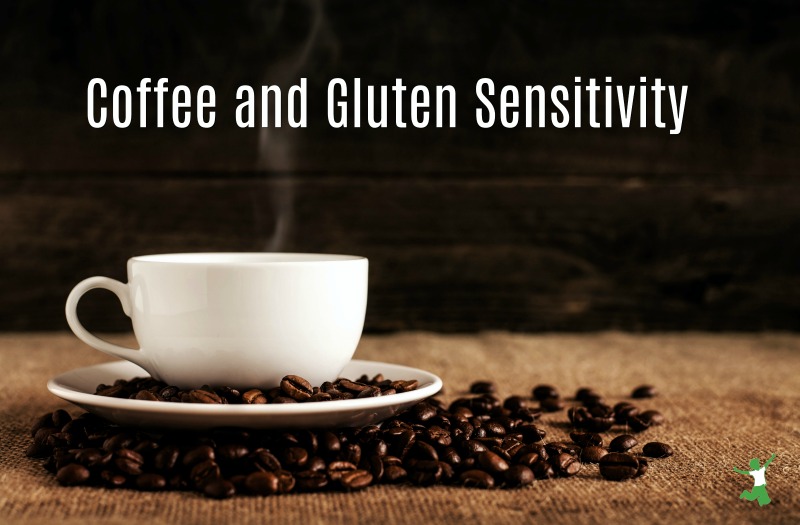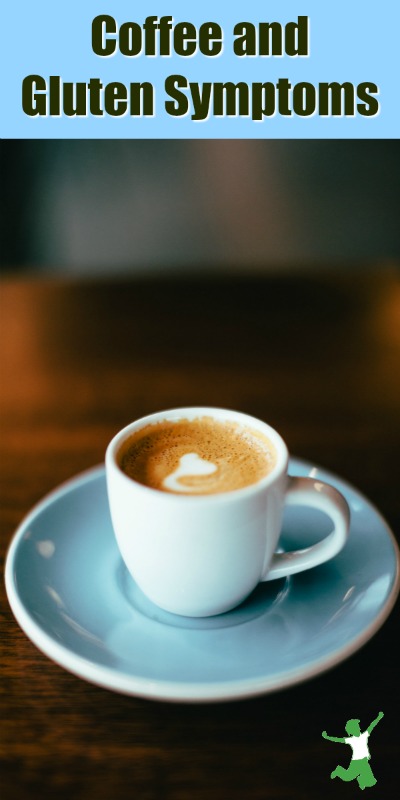Table of Contents[Hide][Show]
Coffee should be avoided by those who are Celiac and many who suffer from wheat sensitivity as it contains cross-reactive proteins to gluten.

If you drink coffee, even bulletproof coffee and have gluten sensitivity or celiac, you might want to sit down for this one.
There is a surprising connection between gluten and coffee that is by and large ignored by the health community. This revelation holds ramifications for other autoimmune disorders as well.
The problem has nothing to do with caffeine, so decaf coffee would be included in this discussion.
In a nutshell, fairly recent lab research has revealed that 10% of coffee is a protein that cross-reacts with gluten antibodies.
This means that if you are gluten sensitive or celiac and are avoiding gluten-containing grains or perhaps have even gone completely grain-free if you still drink coffee there is a strong likelihood that the protein in the coffee is triggering the very same gluten-related health problems you are trying to avoid.
In other words, even if you think you are doing fine with your current gluten-free diet, it is very possible that skipping the coffee could take your health to the next level.
Symptoms of Gluten Sensitivity
Most people who are gluten sensitive don’t realize it because gastrointestinal problems like burping, gas, tummy upset, or toilet issues are the least common way for gluten issues to present themselves!
The most common symptoms of gluten sensitivity?
Migraines and other neurological issues – even MS!
Hormone and endocrine problems are another common way for gluten issues to manifest themselves.
How Coffee Triggers Gluten Sensitivity
So what exactly happens when a gluten sensitive person eats gluten?
Folks with gluten antibodies react to any gluten in the diet by mounting an immune response. This means that gluten is perceived by the body as an invader and the gluten antibodies attack the gluten itself trying to destroy it. This gluten attack is an inflammatory response and inflammation issues can occur anywhere in the body in any tissue or organ.
Here’s the real shocker I came across when researching the coffee/gluten connection:
According to Dr. David Clark DC, functional neurologist and endocrinologist:
There’s not a disease or health condition you can think of that does not have an association – in the research literature – with gluten sensitivity.
That’s a very strong statement!
In essence then, if you are gluten sensitive in any way shape or form, and it seems that most people are whether they know it or not given the epidemic levels of autoimmune issues today, gluten antibodies have the potential to react to proteins in other foods as if they are gluten thereby triggering an immune and inflammatory response.
The protein in coffee is the most common cross-reactor for gluten. Because it is the protein in the coffee that is the trigger, switching to decaf coffee does not solve the problem. Apparently, instant coffee is the worst offender.
Is it possible to be gluten sensitive and not cross-react to coffee? Yes, it’s possible but you’ll have to do some expensive lab testing with a knowledgeable doctor to find out.

Reference
Journal of Food and Nutrition Sciences
More Information
You Probably Need to Change WHEN You Drink Coffee
Coffee Enema
Morning Coffee Fix
Caffeine and Chronic Back Pain
Healthy Coffee Substitutes








While this appears to be somewhat startling news for many celiacs and those living with gluten intolerance, it may NOT apply to everyone. Keep that in mind, If you are not having gastro problems after drinking coffee, then don’t worry about it. What we do know now, according to recent research, is that gluten sensitivity CAUSES autoimmune diseases, not the other way around. We also know that most grains are harmful due to the fungicides and insecticides sprayed on the crops and the havoc those cause to hormones. So it’s entirely possible that coffee beans might also be affected by sprays, so maybe going organic might help. If we were to look at everything we consume and be so picky, it wouldn’t leave much on our plates. I am not defending or recommending giving up coffee.. I am highly gluten intolerant although not celiac, and coffee has never bothered me in any way. It is up to the individual to determine what works for them and what doesn’t and act accordingly.
I don’t understand all this talk about “freaking people out”. What is there to freak out about? That avoiding coffee might help you to feel better? I like the attitude of those who are giving it a try to see if it helps or not.
the freaking out is people’s addictions roaring
Well, I figured it wouldn’t hurt me to go coffee free until I figure out if we have a cross reaction problem. I’ve been coffee free for 4 days now – and while I haven’t noticed a difference for myself yet, my little guy who’s nursing (who’s always had eczema in one form or another) has had a total rebound on his eczema! The patches on his feet which never go away no matter what we’ve tried are almost gone – in just a few days. We haven’t changed anything else he’s eating (other than my new no coffee stance) and we’ve been GF for a year. I love, love, love coffee – but I won’t be going back to drinking it after seeing this. And I was just drinking straight up small roaster home brewed coffee with a bit of cream in it – no sugar, so creamers, no chemicals. Thanks, Sarah!
I’m not celiac and coffee is super pro-liver so I’ll take my chances.
“The point is if you have gone gluten free and you have not improved, then it’s time to explore this issue of cross reactivity with an elimination diet or testing, or both. The exact science behind it ie irrelevant to the gluten sufferer.”
Well said Primo Health Coach! There’s no one size fits all. What works for one may not for another. Trial and error is very important.
My question is whether or not the quality of coffee is an issue. Coffee bean crops are very heavily sprayed. I wonder if consuming organic coffee would be less problematic. Same idea as dairy. I don’t do well with pasteurized dairy but I seem to do fine with unpasteurized dairy from grass fed cows.
I find that the people that get angry at new information like this are those that wish they had the info first. None of the naysayers have revealed their identities nor credentials. In essence they have not substantiated there own comments. They are guilty of the very thing they are complaining about. Self proclaimed Internet police should be ignored in my opinion. Sarah thank you for raising awareness about the complexity of gluten sensitivity. For those of us who work very hard to feel better, it’s a relief to know we are not crazy for still feeling symptoms even after going gluten free. The point to make here though isn’t that all Celiacs should give up coffee. If coffee is not a problem for you then you don’t need to. Coffee isn’t the healthiest food anyways. It is typically full of pesticides and wreaks havoc on the adrenals. The point is if you have gone gluten free and you have not improved, then it’s time to explore this issue of cross reactivity with an elimination diet or testing, or both. The exact science behind it ie irrelevant to the gluten sufferer.
I have to say I agree with Jen on this. No need to freak people out. If there was substantial enough research we wouldn’t have heard it on this blog first & not found anything to back it up. I don’t want to contact a lab, I want decent references before I believe anything. It is one thing to inform people, and completely different to scare them. I normally love the home economist blog, but I am highly disappointed in this post. And I think primo health coach needs to relax and stop calling people bullies.
I find it interesting how you keep harping that there is “nothing” to back it up, yet you refuse to contact Cyrex Labs and talk with them about their leading edge research. Just because you can’t google a peer reviewed study on it doesn’t mean it’s not in fact a substantially important piece of health information.
If leading edge research is something you don’t enjoy, there’s always WebMD.
It’s very easy to find more information on this. First, try Googling “gluten cross reactive foods coffee” and similar search terms.
One website explains how the body often reacts to proteins that are similar in shape to the gluten protein, including the coffee protein in some people. As with all of these health and auto-immune issues, each individual’s body responds somewhat differently depending on many variables.
People who want to do an in depth study of the medical literature can always try PubMed.com.
It does seem strange how people are getting so demanding and irritated about this. I for one am glad to know of the POSSIBILITY that coffee might create a cross reaction. This allows me to look into it further and pay closer attention to any reaction I might have to it. Although I almost never drink it anymore anyway.
Some people get VERY touchy about their coffee. I know this from past experience 🙂
That is my observation from this conversation. Coffee certainly is a touchy subject! 🙂
Sarah, it’s your responsibility as the one posting the blog to post where we can find research. It’s not worth my time to contact a lab when you are sitting here trying to freak people out. I have Celiac and no issues with coffee. Check to make sure your coffee is gluten free, if you have issues with acidic foods, then check with your Dr. to see if you don’t have another stomach issue. People are too quick to add all stomach issues onto Celiac disease. Your thoughts are merely opinions Sarah, just like everyone elses 🙂